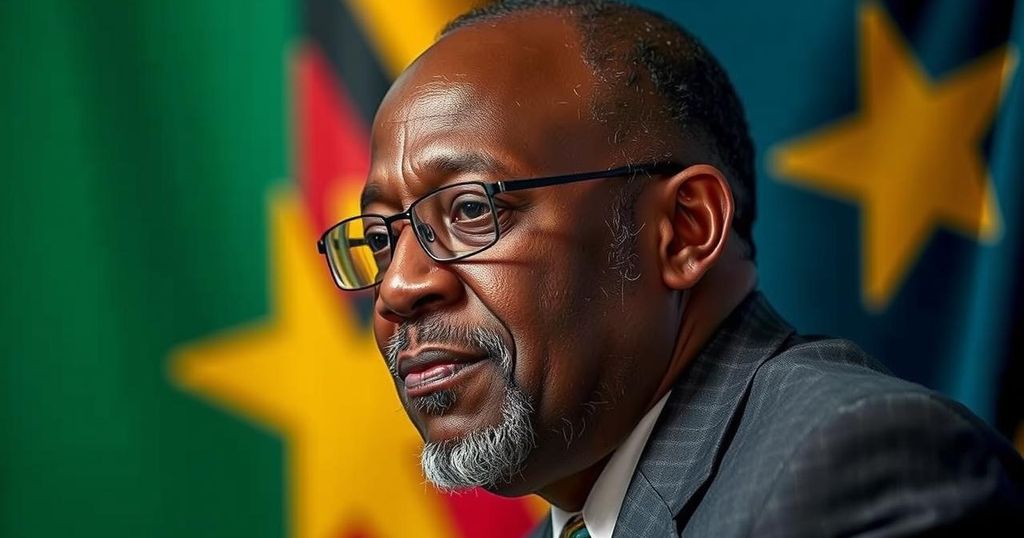Tragic Assassination of Opposition Lawyer Amidst Mozambique’s Contested Elections
In a shocking incident in Maputo, Mozambique, Elvino Dias, lawyer for opposition presidential candidate Venancio Mondlane, and PODEMOS spokesperson Paulo Guambe were shot dead in their vehicle amid rising tensions following a contested election. The killings highlight increased violence against political opponents and ongoing claims of electoral fraud against the long-ruling Frelimo party.
On the night of October 9, in Maputo, Mozambique, a lawyer representing opposition presidential candidate Venancio Mondlane and a senior official of the opposition party PODEMOS were tragically shot and killed while in their vehicle. The incident unfolded late at night on a prominent avenue, escalating existing tensions surrounding the highly contested elections poised to challenge the dominance of the ruling Frelimo party, which has held power for nearly five decades. The deceased, Elvino Dias, was not only a legal advisor but also a prominent figure advocating for electoral reform and justice. He was killed in an apparent ambush carried out by assailants in two vehicles that violently targeted his car, according to statements released by the PODEMOS party. Paulo Guambe, a spokesperson for PODEMOS and a fellow passenger in Dias’s vehicle, also lost his life in the attack, leading to heightened fears regarding the safety of political figures in Mozambique. PODEMOS condemned the murders, asserting that they reflect a systemic lack of justice in the country. The violent incident coincided with the aftermath of a contentious election wherein allegations of voting malpractice and suppression of dissent against the governing party were rife. Preliminary results indicate that Frelimo’s Daniel Chapo is leading the presidential race, albeit amidst accusations of electoral fraud from opposition factions. Dias was reportedly preparing to challenge the election results through legal channels, highlighting the pivotal role he played within the opposition. Furthermore, Adriano Nuvunga, the director of the Centre for Democracy and Development, characterized Dias’s death as a “political assassination,” a claim which underscores the deteriorating climate for political dissent in Mozambique. Despite the gravity of the situation, there was a notable absence of an official response from local authorities following the tragic murders, which occur in a historical context where the Frelimo party, in power since Mozambique’s independence in 1975, has frequently faced allegations of electoral manipulation. Compounding the atmosphere of fear and repression, rights organizations have reported increasing governmental crackdowns on public dissent, as evidenced by the police’s violent dispersal of post-election protests earlier in the week. As tensions continue to mount in the lead-up to the announcement of final election results next week, many analysts view these developments as indicative of the broader challenges to democracy and governance in Mozambique.
The events surrounding the recent election in Mozambique reflect the complex political landscape shaped by the nearly 50-year rule of the Frelimo party. Allegations of electoral fraud, suppression of political dissent, and violence against opposition members have been recurring themes in Mozambique’s political discourse. The emergence of the opposition party PODEMOS, along with candidates like Venancio Mondlane, represents a crucial effort to challenge the entrenched power of Frelimo, which established a one-party state following independence from Portugal and has faced significant accusations of unfair electoral conduct. The incidents leading to the deaths of opposition figures underscore the precarious nature of political participation and expression in the country, fueling concerns over the future of democracy in Mozambique.
The assassinations of Elvino Dias and Paulo Guambe not only signify a profound loss for the PODEMOS party but also illuminate the grave risks faced by political activists in Mozambique. As the country awaits the final election results amidst claims of electoral malpractice, these tragic events call attention to the urgent need for safeguarding democracy, establishing justice, and fostering a political environment where dissenting voices can be heard without fear of violence.
Original Source: www.france24.com




Post Comment